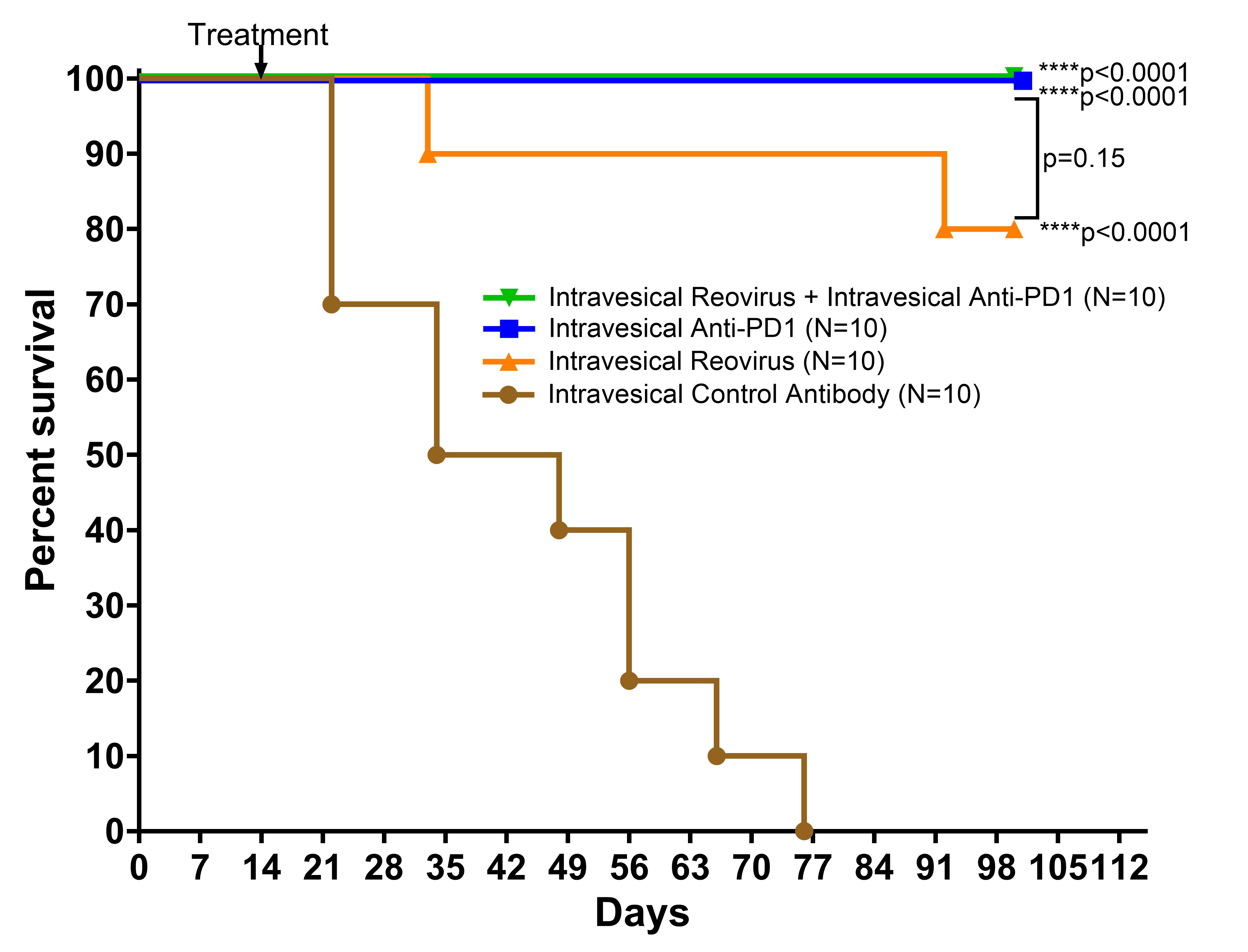Back
Poster, Podium & Video Sessions
Moderated Poster
MP06: Bladder Cancer: Basic Research & Pathophysiology I
MP06-04: Exploring a Novel Synergistic Intravesical Oncolytic Virotherapy for Treatment of Non-Muscle Invasive Bladder Cancer
Friday, May 13, 2022
8:45 AM – 10:00 AM
Location: Room 222
Woodson Smelser*, Jian Wang, Sam Chang, Austin Kirschner, Nashville, TN

Woodson W. Smelser, MD
Instructor of Urology
Vanderbilt University Medical Center
Poster Presenter(s)
Introduction: For BCG refractory NMIBC, systemic anti-PD-1 immune checkpoint inhibition is FDA approved as second line therapy. Prior published work by our group demonstrated comparable efficacy and overall survival with intravesical anti-PD-1 treatments in NMIBC in mice. Additionally, oncolytic viral therapy with reovirus has shown pre-clinical efficacy in the bladder & other cancers. We hypothesized that intravesical instilment with both anti-PD-1 inhibitor & oncolytic reovirus would demonstrate a greater synergistic effect than either treatment as monotherapy.
Methods: We investigated an orthotopic mouse model of urothelial bladder cancer using MBT2 cells implanted into the bladders of (n=40) syngeneic, wild-type C3H mice. Groups of 10 mice were treated 14 days after engraftment at the point of palpable tumor for comparison between no treatment, intravesical anti-PD-1, intravesical oncolytic reovirus, & intravesical oncolytic reovirus + anti-PD1. The primary outcome was overall survival; secondary outcomes include long-term immunity & immune milieu changes indicated by mass cytometric evaluation.
Results: 40 total mice were engrafted with tumor & then treated. At time of submission, all 10 mice receiving no treatment had died, with median survival of 41 days. Median overall survival for the mice receiving reovirus, anti-PD-1 or anti-PD-1 + reovirus had not been reached. Mice receiving reovirus experienced longer survival than control (HR 14.4; 95% CI 3.9-32.6, p<0.0001), as did mice receiving anti-PD-1 alone (HR 28.4; 95% CI 7.0-115.9, p<0.0001). When compared to control alone, combination therapy with anti-PD-1 & reovirus also demonstrated superior survival (HR 28.4; 95% CI 7.0-115.9, p<0.0001). Comparison between anti-PD-1 and reovirus demonstrated no significant differences in survival (p=0.15). See Figure 1 for Kaplan-Meier analysis comparing survival.
Conclusions: Treatment of mice engrafted with MBT2 orthotopic bladder tumors with intravesical therapy with reovirus, anti-PD-1 antibody, or combination anti-PD-1 antibody & reovirus confer superior survival to intravesical controls. Immune profile analysis examining tumor microenvironment differences in immune response are ongoing with mass cytometry and will further bolster our mechanistic understanding of each therapy.
Source of Funding: T32 Grant (WS)

Methods: We investigated an orthotopic mouse model of urothelial bladder cancer using MBT2 cells implanted into the bladders of (n=40) syngeneic, wild-type C3H mice. Groups of 10 mice were treated 14 days after engraftment at the point of palpable tumor for comparison between no treatment, intravesical anti-PD-1, intravesical oncolytic reovirus, & intravesical oncolytic reovirus + anti-PD1. The primary outcome was overall survival; secondary outcomes include long-term immunity & immune milieu changes indicated by mass cytometric evaluation.
Results: 40 total mice were engrafted with tumor & then treated. At time of submission, all 10 mice receiving no treatment had died, with median survival of 41 days. Median overall survival for the mice receiving reovirus, anti-PD-1 or anti-PD-1 + reovirus had not been reached. Mice receiving reovirus experienced longer survival than control (HR 14.4; 95% CI 3.9-32.6, p<0.0001), as did mice receiving anti-PD-1 alone (HR 28.4; 95% CI 7.0-115.9, p<0.0001). When compared to control alone, combination therapy with anti-PD-1 & reovirus also demonstrated superior survival (HR 28.4; 95% CI 7.0-115.9, p<0.0001). Comparison between anti-PD-1 and reovirus demonstrated no significant differences in survival (p=0.15). See Figure 1 for Kaplan-Meier analysis comparing survival.
Conclusions: Treatment of mice engrafted with MBT2 orthotopic bladder tumors with intravesical therapy with reovirus, anti-PD-1 antibody, or combination anti-PD-1 antibody & reovirus confer superior survival to intravesical controls. Immune profile analysis examining tumor microenvironment differences in immune response are ongoing with mass cytometry and will further bolster our mechanistic understanding of each therapy.
Source of Funding: T32 Grant (WS)


.jpg)
.jpg)